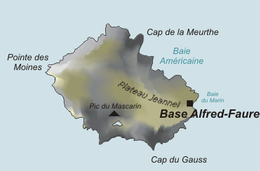Île de la Possession
Nickname: Possession Island | |
|---|---|
 | |
 | |
| Geography | |
| Location | Indian Ocean |
| Coordinates | 46°24′27″S 51°45′27″E / 46.40750°S 51.75750°E |
| Archipelago | Crozet Islands |
| Area | 150 km2 (58 sq mi) |
| Length | 18 km (11.2 mi) |
| Width | 13 km (8.1 mi) |
| Highest elevation | 934 m (3064 ft) |
| Highest point | Pic du Mascarin |
| Administration | |
| Demographics | |
| Population | No permanent inhabitants; temporary research station staff only |



Île de la Possession, or Possession Island, formerly Île de la Prise de Possession, is part of the Subantarctic Crozet Archipelago. Administratively, it is part of the French Southern and Antarctic Lands. It is an important nesting site for seabirds.
Description[edit]
Île de la Possession lies in the eastern group of the archipelago, about 20 km west of Île de l'Est (East Island). With an area of 150 km2 (58 sq mi) it is the largest island of the group and the only inhabited one. It has a rugged landscape of mountains cut by deep glaciated valleys. The coastal areas and valleys are covered with herbaceous subantarctic vegetation. It is uninhabited except for the staff of a research station.[1]
Alfred Faure research station[edit]
The Alfred Faure research station (Base Alfred-Faure) is located at the eastern end of Île de la Possession, at an elevation of 143 m above Baie Marin (Port Alfred). It comprises about 12 main buildings and supports up to about 45 visiting personnel. It is named after a leader of the base in the 1960s. A 1.6 km road and aerial cableway connect the base to the sea, where supplies are brought by the vessel Marion Dufresne. The daily temperature at the site varies annually from an average high of 7.9°C to an average low of 2.7°C.[2]
History[edit]
In 1840 the Ross expedition anchored near the island to bring provisions to a stranded group of eleven elephant-seal hunters.
Wildlife[edit]
Birds[edit]
The island has been identified as an Important Bird Area (IBA) by BirdLife International as a breeding site for seabirds, of which there are at least 26 breeding species. Birds nesting in relatively large numbers include king, northern rockhopper and macaroni penguins, wandering, sooty and light-mantled albatrosses, northern giant petrels, medium-billed prions, Kerguelen and soft-plumaged petrels, and South Georgia diving petrels. Other island breeders in smaller numbers are southern giant petrels, grey-headed albatrosses and Kerguelen terns. Crozet blue-eyed shags, black-faced sheathbills and Eaton's pintails are resident. The smaller birds nest only at higher altitudes because of their vulnerability to rat predation at lower levels.[1]
Other wildlife[edit]
The goats that were introduced have been eradicated, though black rats remain and are a threat to the birdlife. Both Antarctic and subantarctic fur seals, as well as southern elephant seals, breed on the island. A pod of about 80 killer whales inhabits the surrounding waters. Two plants and 59 arthropod species endemic to the archipelago are present.[1]
See also[edit]
References[edit]
- ^ a b c BirdLife International. (2012). Important Bird Areas factsheet: Île de la Possession. Downloaded from http://www.birdlife.org on 2012-01-10.
- ^ "Alfred Faure Station". EPB - Stations. European Polar Board. 2023. Retrieved 2023-10-26.
